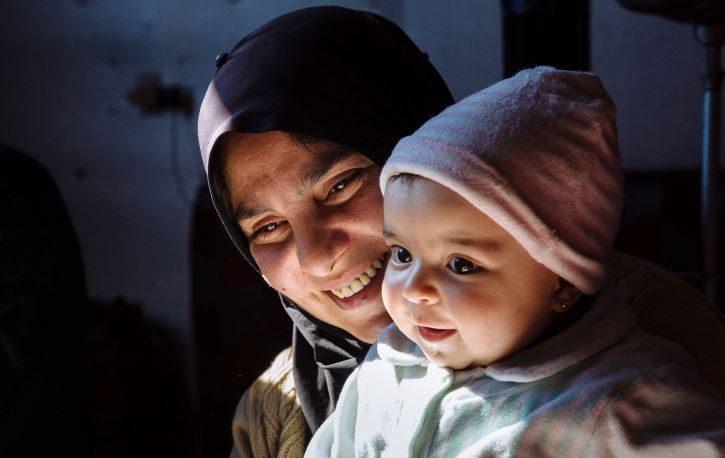Nepal is among 25 countries that deny women right to pass on citizenship to children independently
South Asia Check / March 15, 2019
In Nepal while there is a debate ongoing over whether to grant the women the right to confer citizenship to their children without any exception and limitation. South Asia Check has examined the citizenship laws and gender equality in the global context.

Photo: Courtesy of UNHCR/David Azia
According to a survey report on Gender Equality, Nationality Laws and Stateless 2018 prepared by the Office of the United Nations High Commissioner for Refugees (UNHCR), equality between men and women relating to conferral of nationality upon children has not yet been attained in 25 countries. The majority of these states are in the Middle East and North Africa (twelve countries) and Sub Saharan Africa (six countries). In Asia and the Pacific there are five countries and in the Americas two countries that do not grant mothers equal rights as fathers to confer their nationality on their children. It is important to note that an additional group of states grants equality to men and women with regard to the nationality of children but not with regard to acquisition, change or retention of nationality upon change in civil status.
The classification of countries that limits women to confer nationality to their children
The table below uses a color scheme to divide the laws of the 25 countries into three categories. The laws of the first group of countries (red) have nationality laws which do not allow mothers to confer their nationality on their children with no, or very limited exceptions. These laws create the greatest risk of statelessness. The laws of the second group of countries (orange) have made some exceptions for mothers to confer nationality if the father is unknown or stateless. The laws of the third group of countries (yellow) also limit the conferral of nationality by women but additional guarantees ensure that statelessness will only arise in very few circumstances.

Table: Courtesy of UNHCR report
The law in Qatar doesn’t allow mothers to confer nationality on their children, without exception. According to the law of Kuwait, if a Kuwaiti mother has a child with a father who is unknown or whose paternity has not been established, the individual concerned may apply for Kuwaiti citizenship at majority. In such cases, nationality is granted by decree based on the discretionary recommendation of the Minister of Interior. However, this is an extraordinary measure that occurs rarely in practice.
The nationality law of Lebanon also allows only Lebanese fathers to confer their nationality on their children in all circumstances. Women can only confer their citizenship if the child is born out of marriage and recognized while a minor by the Lebanese mother.
The nationality laws of Jordan, Libya, Saudi Arabia and the United Arab Emirates do not allow women nationals married to foreign nationals to pass their nationality to their children. However, they do permit women nationals to confer their nationality on their children in certain circumstances such as where fathers are unknown, stateless, of unknown nationality or do not establish filiation.
In Iraq, although the Iraqi Constitution of 2005 establishes gender equality by providing that nationality is acquired by descent from either men or women, Iraq’s 2006 nationality law limits the ability of Iraqi women to confer nationality on children born outside the country. For such births, the child of an Iraqi mother may apply for Iraqi nationality within one year of reaching majority, providing that the child’s father is unknown or stateless and the child is residing in Iraq at the time of the application.
According to the nationality law of Syria, mothers can only confer nationality if the child was born in Syria and the father does not establish filiation in relation to the child. The law of Bahrain allows mothers to confer their nationality on their children born either in their home countries or abroad if the fathers are unknown or stateless. Under the law of Oman, mothers confer nationality on their children born either in their home countries or abroad if the fathers are unknown or are former Omani nationals.
In Mauritania, mothers can confer nationality on children when the father is unknown or stateless. Children born in Mauritania to Mauritanian mothers and foreign fathers, or to mothers who were born in Mauritania themselves, also acquire Mauritanian nationality. Children born abroad to Mauritanian mothers and foreign fathers can opt for Mauritanian nationality in the year before majority.
The laws of Somalia and Swaziland do not allow mothers to confer their citizenship on their children under the same conditions as fathers. Under the 1962 Somali Citizenship Law, only children of Somali fathers acquire Somali citizenship. Swaziland’s Constitution of 2005 stipulates that any child born inside or outside Swaziland prior to 2005 to at least one Swazi parent acquires Swazi citizenship by descent. However, children born after 2005 only acquire Swazi citizenship from their fathers, unless the child was born out of wedlock and has not been claimed by the father in accordance with customary law.
In Burundi, the 2000 Nationality Code does not allow mothers to transfer nationality to children except when maternal filiation is established when they are born out of wedlock to unknown fathers or if disowned by their fathers.
In Liberia, the Aliens and Nationality Law of 1973 allows children born in Liberia to acquire Liberian citizenship at birth. Children born abroad to Liberian mothers, however, are excluded from acquiring Liberian citizenship. In case of Togo, the 1978 nationality grants citizenship to children born in its territory who cannot claim the nationality of another state, it only allow mothers to confer their nationality on their children if the father is stateless or of unknown nationality.
In Sudan the amended law in 2005 allows a child born to a Sudanese mother to acquire Sudanese nationality by birth by following an application process.
In Brunei Darussalam and Iran, only fathers can confer their respective nationalities on their children in all circumstances.
In Kiribati, children born in the country to an i-Kiribati father or mother can acquire nationality of Kiribati; however, only children born abroad to i-Kiribati fathers, not mothers, acquire the nationality of Kiribati. In Malaysia, children born in the country to either Malaysian mothers or Malaysian fathers automatically acquire Malaysian nationality. But children born to Malaysian mothers outside of Malaysia may only acquire Malaysian citizenship at the discretion of the Federal Government through registration at an overseas Malaysian consulate or at the National Registration Department in Malaysia.
In Nepal, children born to Nepali fathers acquire Nepali citizenship in all circumstances. Children born in Nepal to Nepali mothers and foreign fathers can apply to acquire citizenship through naturalization, provided they have permanent domicile in Nepal and have not acquired the foreign citizenship of their fathers.
In The Bahamas, children born in the country to either a Bahamian father or mother acquire Bahamian nationality; however, only children born abroad to Bahamian fathers, not mothers, can acquire Bahamian nationality. The same applies in Barbados, where children born in Barbados to either Barbadian mothers or fathers acquire Barbadian nationality, but Barbadian mothers cannot confer nationality on their children born abroad, whereas Barbadian fathers can.
This material is copyrighted but may be used for any purpose by giving due credit to southasiacheck.org.
Comments
Latest Stories
- In Public Interest Covid-19 cases are low, but that’s not an excuse to avoid vaccination
- In Public Interest What is BF.7, the sub-variant that has the world by its grip?
- In Public Interest Threat of a new Covid-19 wave looms large amid vaccine shortage in Nepal
- In Public Interest As cases decline, Covid-19 test centres in Kathmandu are desolate lot
- In Public Interest Dengue test fee disparity has patients wondering if they’re being cheated
- In Public Interest As dengue rages on, confusion galore about what it is and what its symptoms are. Here’s what you need to know
